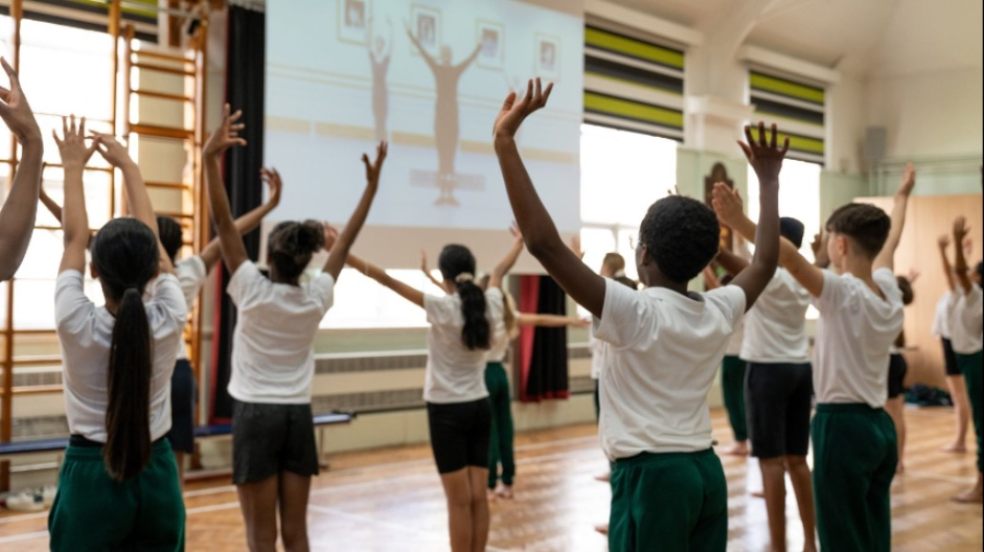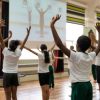
How The Royal Ballet School Helps Primary Schools Teach Dance Through Primary Steps on Demand
While dance is a mandatory component of the curriculum for all UK primary schools, many schools have little-to-no dance provision. This lack of resources is more likely to affect less affluent areas, where several schools don’t have the funding, resources, or curriculum capacity to teach dance effectively.
Fortunately, The Royal Ballet School is helping primary schools overcome this challenge with a flexible online programme that gets children dancing from £3 per student: Primary Steps on Demand.
This is how the on-demand programme makes it easy for primary schools to integrate a high-quality ballet education into their curriculums.
How Primary Steps on Demand Works
The Royal Ballet School has been delivering creative dance training to children in England since 2006. The in-person Primary Steps Programme promotes economic, social, and cultural diversity, with 28 participating primary schools and more than 1,900 children taking part annually.
Now, Primary Steps on Demand, the virtual edition of the programme, extends access to primary schools everywhere. The Royal Ballet School has designed the programme to address the accessibility challenges that many schools face when it comes to dance education. Now, schools around the world can unlock the many benefits of dance for children.
Delivered through the School’s video-on-demand platform, the programme is for Years 3 to 6, with classes split into two age groups: 7 to 9 and 9 to 11.
The programme includes:
- Video classes that explore key ballet concepts and cover cross-curricular themes.
- Movement guides, including warm-ups and cool-downs.
- Full lesson plans and pupil resources.
- Tutorials, notes, and guidance for teachers.
Schools using Primary Steps on Demand simultaneously fulfil their dance teaching requirement and provide students with a quality ballet education.
Many schools also find the programme is an ideal use of PE and sport premium funding, as Primary Steps on Demand includes ongoing training, support, and continued professional development (CPD) sessions to upskill teachers.
Five Ways Primary Steps on Demand Helps Schools Teach Ballet
Here are five ways The Royal Ballet School’s Primary Steps on Demand Programme enables primary schools to teach ballet.
1. A Cost-Effective, Convenient Solution
Primary Steps on Demand is an ideal solution for primary schools that need to incorporate dance into their curriculums cost-effectively and conveniently.
The programme offers a range of price options for schools of different sizes:
- Tier 1 — For small schools (1-form entry), the programme costs £500 per year.
- Tier 2 — For medium schools (2-form entry), the programme costs £750 per year.
- Tier 3 — For large schools (3 or more form entry), the programme costs £1,000 per year.
- Tier 4 — For non-schools, such as community groups, dance schools, home educators, or children’s clubs, the programme costs £150 per year.
Schools may sign up for 12 months at a time, and the programme is renewable each year.
Another cost-effective benefit of Primary Steps on Demand is that it doesn’t require any additional outlay for equipment. Moreover, many of the programme’s exercises suit smaller spaces, minimising the need to access large venues such as school halls.
2. Flexible Programme Delivery
Primary schools access Primary Steps on Demand through The Royal Ballet School’s video-on-demand platform, so the programme is fully flexible. Teachers can decide when and how to deliver the content. Plus, the material’s versatility allows educators to adapt classes to meet students’ learning needs.
3. Inclusive Content
The School has crafted the programme to be accessible for all children, including children with special educational needs (SEN), sensory impairments, and disabilities. The School’s inclusive ethos extends to the programme’s use of language, and the Royal Ballet School teachers who lead the classes ensure their communication is accessible and gender-neutral.
4. Skills Development and Cross-Curricular Approach
As a ballet-focused dance programme, Primary Steps on Demand introduces children to core components of classical ballet through “Exploring Ballet” classes. The video library also offers short movement guides that encourage children to get active while discovering new ideas.
Primary schools can expect the programme to enhance dance-specific outcomes and improve children’s wider learning and development. Teaching dance to young people can help them develop their:
- Physical skills, such as strength, balance, agility, and coordination.
- Problem-solving and critical thinking skills.
- Collaboration and communication skills.
- Self-expression, creativity, and curiosity.
- Confidence and self-sufficiency for learning.
The programme’s classes also help develop children’s numeracy, literacy, and emotional well-being.
In “Exploring the Curriculum” classes, the programme takes a cross-curricular approach to curriculum content. Each class encourages children to explore a subject through ballet and creative movement. The class themes include Ancient Egypt, art, geometry, the water cycle, electricity, earth and space, World War II, and evolution.
This practical, experiential, and cross-curricular approach is also known as embodied learning, which helps children build new connections across their education. The exploration of curriculum topics through dance allows young people to integrate different skills and disciplines, embedding new ideas in their minds and bodies.
5. No Dance Teaching Experience Required
Schools with teachers who have external dance teaching qualifications are more likely to offer students regular dance classes. However, for many teachers, the main barrier to teaching dance is a lack of knowledge and experience. Some feel they aren’t given the chance to observe dance teaching in practice or receive dance-specific teaching guidance.
Victoria Collinson, The Royal Ballet School’s Primary Steps and Associate Programme artistic manager, says that Primary Steps on Demand is furthering the School’s mission to make dance accessible for teachers as well as students.
“Many teachers we’ve spoken to would love to be dancing with their pupils regularly, but they don’t know where to start,” she explains. “It can’t be the case that pupils’ experience is reliant on some teachers already having dance knowledge by chance.”
With Primary Steps on Demand, primary schools needn’t worry about their teachers lacking the confidence or expertise to deliver dance education. The programme explains all ballet vocabulary, and a Royal Ballet School Primary Steps teacher takes each class. These classes also feature music from an accompanying musician and demonstrations from Royal Ballet School and Associate students.
Each class also comes with resources for students, tutorials and advice for teachers, and a full lesson plan. These plans guide teachers on how to integrate numeracy, literacy, and emotional well-being into the programme delivery and learning outcomes.
The Royal Ballet School is always on-hand to provide support, from technical assistance to guidance on how teachers can structure and implement the programme.
The School hopes to grow a mutually supportive community of the schools using Primary Steps on Demand. This community will allow teachers to share ideas and experiences as they develop their dance education skills and confidence.
CPD Opportunities
Schools subscribing to Primary Steps on Demand also have the opportunity for teachers to join regular CPD sessions delivered over Zoom. During these sessions, Royal Ballet School staff help teachers:
- Make the best use of the programme content.
- Ensure safe practice.
- Understand the fundamentals of dance teaching and some basic ballet mechanics.
The School emphasises that it’s not essential for the primary school teachers who deliver the programme to have dance teaching experience. Similarly, primary school teachers don’t need to become ballet instructors to deliver the programme. However, upskilling teachers can enhance children’s experience of the programme and help teachers get the most out of the Primary Steps on Demand content.
Collinson highlights that primary school teachers already have “a wealth of knowledge” on the curriculum, their students, and the teaching and learning process. By bringing their “innate abilities” and skills as educators to dance, teachers can enrich the Primary Steps on Demand Programme while feeling confident that they have The Royal Ballet School’s support.
Opening Up the World of Dance
The Royal Ballet School advocates for children everywhere to have the right to participate in and enjoy the arts. Primary Steps on Demand aligns with the School’s mission to “open up the world of dance for all children, whatever their background or circumstances.” Collinson adds that the programme offers students “the opportunity to experience the simple enjoyment of dance.”
Primary Steps on Demand continues to enable primary schools to offer an excellent dance education with ease. This offering is particularly valuable for primary schools that may otherwise struggle to explore the potential for dance in their curriculums.
Find out more about The Royal Ballet School’s Primary Steps on Demand Programme.
About The Royal Ballet School
Established in 1926, The Royal Ballet School has delivered world-class ballet training for almost 100 years. The School has produced generations of dancers and choreographers of international acclaim. Well known alumni include Margot Fonteyn, Darcey Bussell, Jonathan Cope, Marianela Nuñez, and Christopher Wheeldon.
The School’s admissions process evaluates only a young dancer’s talent and potential for classical ballet, disregarding their academic ability or personal circumstances. On average, 88% of students rely on financial support to attend the School.
Full-time students thrive and develop as performers during the dance course, supported by extensive academic, pastoral, and healthcare programmes. The School equips young creatives to flourish in their futures, whether they follow careers in the world of classical ballet or beyond.
In line with its mission to proactively widen access to ballet, The Royal Ballet School offers a range of dedicated digital and in-person programmes for primary school children, dance teachers, and the public. The School has a special focus on improving ballet accessibility in areas that have poor access to arts education.




















